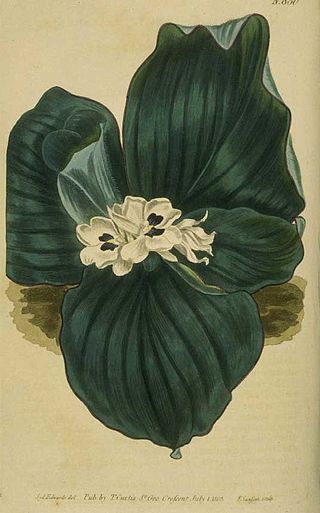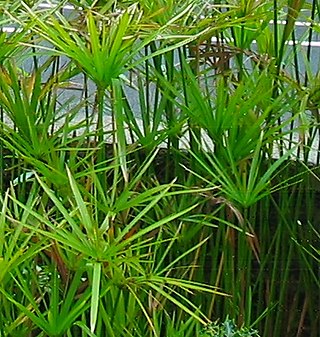
Galangal is a common name for several tropical rhizomatous spices.

Cyperus papyrus, better known by the common names papyrus, papyrus sedge, paper reed, Indian matting plant, or Nile grass, is a species of aquatic flowering plant belonging to the sedge family Cyperaceae. It is a tender herbaceous perennial, native to Africa, and forms tall stands of reed-like swamp vegetation in shallow water.

The Cyperaceae are a family of graminoid (grass-like), monocotyledonous flowering plants known as sedges. The family is large, with some 5,500 known species described in about 90 genera, the largest being the "true sedges" genus Carex with over 2,000 species.

Cyperus is a large genus of about 700 species of sedges, distributed throughout all continents in both tropical and temperate regions.

The procerus muscle is a small pyramidal slip of muscle deep to the superior orbital nerve, artery and vein. Procerus is Latin, meaning tall or extended.

Cyperus rotundus is a species of sedge (Cyperaceae) native to Africa, southern and central Europe, and southern Asia. The word cyperus derives from the Greek κύπερος, kyperos, and rotundus is from Latin, meaning "round". The earliest attested form of the word cyperus is the Mycenaean Greek 𐀓𐀞𐀫, ku-pa-ro, written in Linear B syllabic script.

Cyperus alternifolius, the umbrella papyrus, umbrella sedge or umbrella palm, is a grass-like plant in the large genus Cyperus of the sedge family Cyperaceae. The plant is native to West Africa, Madagascar and the Arabian Peninsula, but widely distributed throughout the world. It has gained the Royal Horticultural Society's Award of Garden Merit. The subspecies Cyperus alternifolius ssp. flabelliformis is also known as Cyperus involucratusRottb..

Cyperus polystachyos, also known as Pycreus polystachyos, and also called manyspike flatsedge in the US, or bunchy sedge, coast flatsedge, many-spiked sedge or Texas sedge in Australia, is a herbaceous species in the family Cyperaceae, widespread in tropical and subtropical areas around the world, sometimes extending its range into temperate regions.

Cyperus eragrostis is a species of sedge known by several common names, including tall flatsedge, nutgrass, tall nutgrass, umbrella sedge, chufa, Earth almond, zula nuts, edible galingale and pale galingale.

Cyperus fuscus is a species of sedge known by the common name brown galingale, or brown flatsedge. This plant is native to much of Europe, Asia and North Africa from England, Portugal and Morocco east to China and Thailand. It is an introduced species in North America, where it is naturalized in widely scattered locations in the United States and Canada.

Cyperus odoratus is a species of sedge known by the common names fragrant flatsedge and rusty flatsedge. This species is quite variable and may in fact be more than one species included under one name.

Cyperus scariosus is a perennial herbaceous plant from Australia and New Guinea.

Cyperus laevigatus is a species of sedge known by the common name smooth flatsedge.

Enixotrophon procerus is a species of sea snail, a marine gastropod mollusk in the family Muricidae, the murex snails or rock snails.

Cyperus longus is a species of sedge known by the common names of sweet cyperus and water rush in Africa, or in Britain galingale.

Cyperus compressus, commonly known as annual sedge, is a sedge of the family Cyperaceae that has a wide distribution throughout countries with warmer climates. It is found in tropical areas of Africa, Asia and the Americas.

Cyperus flavescens, commonly known as the yellow flatsedge, is a species of flowering plant belonging to the family Cyperaceae.

The JapaneseRed List is the Japanese domestic counterpart to the IUCN Red List of Threatened Species. The national Red List is compiled and maintained by the Ministry of the Environment, alongside a separate Red List for marine organisms. Similarly drawing on the relevant scientific authorities, NGOs, and local governments, the Ministry of the Environment also prepares and publishes a Red Data Book that provides further information on species and habitats.

















